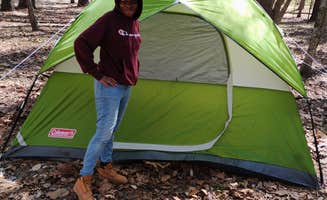Dispersed camping near Garner, North Carolina is concentrated primarily within Wildlife Management Areas that follow strict seasonal operations. The terrain features mixed hardwood forest with elevations ranging between 250-350 feet above sea level. Most primitive sites in this region have no facilities and require campers to be entirely self-sufficient with water, waste management, and emergency supplies.
What to do
Fishing opportunities: Access to nearby lakes makes Butner Lake WMA popular for anglers. A camper noted, "There is a lake 2 mins away one way and another 7 mins away the other way," making it convenient for those planning fishing excursions during their stay.
Wildlife observation: The area offers excellent opportunities for wildlife watching. Visitors have reported seeing diverse wildlife around the Butner Lake WMA campsites. One camper shared, "I heard many coyotes elks and a an owl but nothing never stumbled to our campsite close enough to get a look at it other than one young fox which was running away when we pulled in one late night."
Supply runs: The proximity to town allows for easy resupply. According to a visitor, "Very primitive, but close to town if you need anything." This makes extended stays more manageable as campers can quickly access food, ice, or emergency supplies within minutes.
What campers like
Affordability: The cost-free camping is highly valued by visitors to the area. One camper at Butner Lake WMA emphasized this benefit, stating "And the best part is its FREE CAMPING!!" This makes it an economical option for budget-conscious outdoor enthusiasts.
Convenience for overnight stays: The accessible location makes these sites popular for travelers passing through. A reviewer mentioned, "Very easy to get too, right off interstate. very primitive but you have a decent signal if you need to park and get work done. Great spot to sleep if you are passing through!"
Cellular connectivity: Despite the primitive setting, most campers report adequate phone service. One visitor commented, "Our Boost mobile wi-fi worked perfectly fine," which allows campers to stay connected even in these remote settings.
What you should know
Licensing requirements: Campers should be aware of potential permit needs. A recent visitor to Anderson Creek County Park warned, "All Campers MUST have a fishers/hunters license. Rangers wrote us a warning ticket for not having our own, but we are headed to Walmart to get one for about $30."
Seasonal restrictions: The campgrounds follow strict operational calendars. A camper clarified, "Only open Sept 1 to Feb 28th and March 31 to May 14," which aligns with hunting seasons in the region.
Site layout: Expect minimal privacy between camping spots. According to one visitor, "Sites are very close together, no privacy. Most campers are here to hunt so are gone most of the day." Weekday visits typically see lower occupancy rates.
Tips for camping with families
Site selection: For families, choosing sites with easier access is recommended. A camper described the layout: "Right off the road, easy access and perfect sites for 1 car and a tent. Only open during hunting seasons though."
Timing considerations: Families should consider visiting during non-peak hunting periods. During weekdays, one camper noted, "It was not crowded when I was there during the week. I was only there on a Tuesday," which might provide a quieter experience for those with children.
Emergency preparation: With no facilities available, families should pack additional supplies. One visitor emphasized the basic nature of the sites: "Works perfectly, especially in a pinch," suggesting that preparedness is essential for comfortable family camping.
Tips from RVers
Size limitations: Large RVs and trailers face significant challenges at these sites. A camper warned, "This is a small road and if you had a camper of any size it would take you a while to turn around. Very few places. Like someone said earlier this is a place to pitch a tent or to Car Camp."
Maneuvering difficulties: RVers report mixed experiences with larger vehicles. While one camper stated, "Saw one other person here come in with a 30 foot trailer, didnt think he would fit but found a spot just fine," most reviews suggest caution for anything beyond smaller camper vans or truck campers.
Arrival timing: RVers should plan to arrive during daylight hours for easier navigation. One camper shared their night arrival experience: "first time doing any type of dispersed camping but it was really easy to find, just off the road in the woods, just follow the coordinates and its a lil past, look for the signs."


